#you have to make that decision knowing what the pitfalls are but i can understand wanting to do something else
Explore tagged Tumblr posts
Text
Consumerism & Witchcraft
Written by Marimo (he/they)🌿
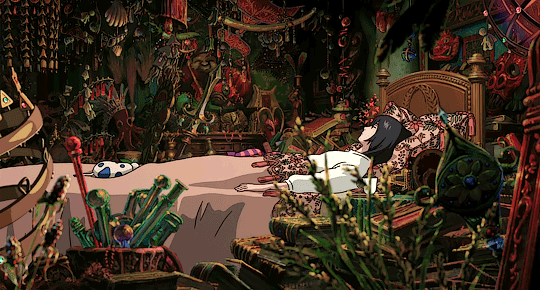
I’ve seen a turn for the better in some witchy spaces regarding consumerism in the past few years, but overall it still tends to be an issue for us as a community. I’ve decided to try and breakdown the pitfalls I’ve noticed in my own journey, in the hopes that it will inspire and assist others. I’ve also provided alternatives and ideas on how to make small changes in our practice to help us better protect the Earth, stick it to the failing system and still acquire our bits and bobs we love so dearly.
As always, I am no authority on any subject nor am I perfect—but we’re all learning as we go, so let’s dive right in 🌿
A Preface
There are some things that should be made entirely clear before we begin:
You are not a bad person for wanting an aesthetic
You are not a bad person for unknowingly falling into pitfalls. Only if you continue to purposefully do so after knowing better
You are not a bad person for consuming content/objects or for not always making the most sustainable decisions. At the end of the day, we can only control our small part of environmental impact, while the rest is left up to the major corporations that make more pollution than any of us ever will
You are only human. Show yourself some grace and understanding that the internet so lacks.
My Experience in Consumerist Hell
I have fallen victim many times to consumerism in witchcraft. Starting my journey at the ripe age of about ten years old and heavily in the broom closet, I was quickly drawn in by the shiny rocks, the brand new candles and scents, the promise of new tarot decks and pendulums and other fancy, shiny new equipment. I was consuming an online aesthetic along with my ideals, and it distracted me from starting my journey by learning well.
I began to spend my birthday and holiday money on the aesthetic of things. While, granted, I still did buy a few literary resources now and again from my local secondhand bookstore—I was stubbornly ignoring the sage advice to learn and understand first before diving in headfirst.
I purchased statues, crystals, too many tarot decks to use. I purchased osteomancy bones I later returned to the earth, for I had not done enough research to know that that animal was mine to practice with. I had a tankard full of incense sticks, and even a growing pile of books that would not be read. While I liked to consider myself crafty with my homemade Maypole and various hand-bound Grimoires, something was becoming apparent: this was all a distraction.
The aesthetic I was partaking in was providing me with a false sense of progress and practicality.
When I’d go to do a tarot reading, I’d become far too overwhelmed with choosing a deck to read in the first place. When making an offering to a deity, I’d feel pressured to also bolster the altars of all the other deities I’d set up, and with my wide pool, the connections felt muddy. Often times I’d be off-put on a project or spell because I knew I needed to film it and it needed to look nice.
In the long term, I don’t have many of these items today. I’ve sold and donated a vast breadth of them. Feeling overwhelmed costed me a few years retreat from my craft to recuperate. However, what has stuck with me is the knowledge I picked up along the way.
So, What’s the Issue? TL;DR
I’ve noticed a few issues here in making these mistakes myself.
Consumerism absolutely distracts you from learning and your craft
Overconsumption leads to environmental damage. If everyone hoarded supplies, there would not be enough to go around. And with what gets thrown away every year…it paints an ugly wound on the Earth
We damage our learning abilities by not allowing ourselves to be anything less than perfect
The need for aesthetic creates barriers to entry within the community and creates a divide of haves and have-nots
You won’t be able to truly follow your individual path if you are only consuming and not creating for yourself
Consumerist culture promotes appropriation. Metaphysical stores carry items from closed practices (such as white sage and palo santo, or coyote bones) because someone is buying them. Don’t be that person, and find alternatives relating to your own culture instead
Consumerism can influence your spiritual decisions based upon monetary inclinations (where some may sacrifice a quality ingredient over a higher quantity of a lower quality ingredient)
So, what can we do?
Firstly, I want to clarify that I am not against collecting, nor am I against maximalism or the beautiful visual aesthetic we carry as a community.
I am an artist a very visual person and understand the longing for a beautiful home and workspace. However, this aesthetic shouldn’t come at the cost of irresponsibly harming the Earth or another community.
Thus, I’ve compiled a list of small things that I will be incorporating into my practice to make it more mindful and sustainable. I hope that you’ll join me in a few of them.
Minimize Supplies. While I used to have a huge selection of stationary for my Grimoire, I now limit myself to a simple pencil and watercolor set if I’m feeling artistic. This helps me actually use my Grimoire for study, rather than to keep perfect. It’s also friendlier on my wallet!
Thrift Supplies. There are plenty of perfectly good items that get donated daily. You can get high-quality candles and holders, old crystal bowls for altar offerings, spare crafting supplies, fabric for alter cloths and even clothing if you so wish—all for a fraction of the cost new and while saving the planet just a little bit more. Hell, you can sometimes even find good silver!
Share Supplies with your Community. You can create a sort of barter system with other witches in your area. Perhaps you create a sigil for them, and they provide you with a candle spell. Play to your strengths and grow together!
Look for Creative Outlets. Do you really need to go buy an altar statue that’s been mass-produced? Or can you give your deity the personal gift of a drawing, painting or even hand-modeled or hand-carved rendition? This will also deepen your connection to your craft and your magic, and make it more meaningful and stronger. If you really like something, though, go for it!
If you aren’t the artistic sort, consider supporting an artist before going to a large company. While I haven’t purchased from them myself, Blagowood on Etsy has beautiful deity statues carved from wood by their small team in Ukraine for a comparable cost to the standard mass produced metal statues. I consider this extra labor of love going into these pieces and those of similar small companies to be much better energy for my practice. I myself may put out some art prints and other handmade supplies in the future, but I will likely spread them around my community first.
Try Secondhand Books. While not available in every area and further still not as available for witchcraft and occult books, you may strike luck! Not only are secondhand books less expensive, but you’ll be supporting a local business. That’s not to say you can’t buy firsthand books, but some searching around may be beneficial to the earth and to your wallet in the long run.
Be mindful of where you source supplies and decor. If you are a fan of taxidermy decor, make sure that you source cruelty free. Bats can practically never be sourced without cruelty, so if a shop carries them, I’d be mindful of their other specimens. The same goes for if a shop decides to forgo a culture’s wishes and carry supplies sacred to them, such as white sage or dreamcatchers. Supporting folks who turn a profit off of others’ suffering is not something many would wish to include energetically in their craft.
Search the Wild for Tools. Find sticks, flowers and other plants out in the forest. Learn how to rockhound in your area for crystals. Your craft will be more powerful the more connected it is to the land you are surrounded by. Be sure to reference guides for safety and legality!
Get Creative with Purposes. If you are having difficulty finding exactly what you need by thrifting or searching, make another tool multipurpose if it would do the job good enough. Find supplies that are easy to source and work as substitutes for other ingredients (ex. Quartz as a stand in for other stones)
Spend more time Doing. Go out into the woods (safely) and advance your connection to the earth instead of worrying over the perfect item for your collection. Your craft will benefit
At the end of the day, all of this is your decision. Take what you like, and leave what you don’t. Even if we don’t agree, I thank you for your time and open mind. I will continue updating about how I incorporate these steps, and I will also hopefully post more on witchy crafting in the future.
I wish you well, and hope you’ll decide to follow along on our journey!
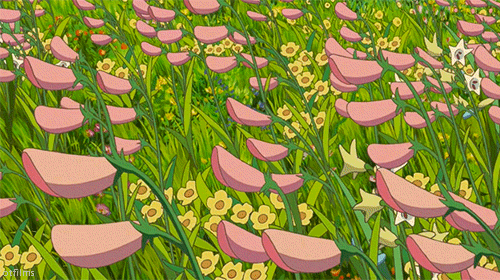
882 notes
·
View notes
Text
Beyond the Word Count: A Book Editor's Guide to Writing a First Draft

Every year, we’re lucky to have great sponsors for our nonprofit events. First Draft Pro, a 2023 NaNoWriMo sponsor, is a beautifully designed writing app for fiction writers. Today, they've partnered with Kelly Norwood-Young, former book editor for Pan Macmillan and Penguin Random House, to bring you some pro tips on writing your first draft:
In my career as a book editor, I’ve reviewed hundreds of manuscripts. I've seen the joy of authors creating compelling tales, but also how disheartening it can be to rewrite a disjointed story. I’m here to give you some strategies to address common pitfalls so that you not only reach your NaNoWriMo goal, but also lay the groundwork for a manuscript that truly deserves to be called a gripping novel.
1. Have a plan.
Even if you’re more of a ‘pantser’ than a ‘planner’, it's really helpful to have an outline. I have two favourite approaches for this: the structure-first approach, and what I call the ‘Phoebe Waller-Bridge approach’.
The structure-first approach
There are a lot of narrative frameworks for story structure, but the most foundational in Western fiction is the three-act structure. Here’s a handy guide that breaks each of the classical three acts into a day-by-day guide to NaNoWriMo:
8-day guide to Act 1
14-day guide to Act 2
8-day guide to Act 3
The Phoebe Waller-Bridge approach
I love this quote from Phoebe Waller-Bridge: ‘I’ve never thought structure first. I’ve always thought material first, jokes first, character first ... But knowing the end really helps. Then you just go as far away from the end emotionally as you possibly can.’
Sketch out your major story arcs, your character’s desires and conflicts, and the world they inhabit. The more you know your story's world and inhabitants, the less you'll stray into scenes that lack purpose or create plot and character inconsistencies.
2. Keep the story moving.
Each word needs to propel your story forward. Superfluous details or tangents that don’t serve the narrative stall the momentum you’re trying to generate for your reader.
There’s a trick you can use to move your story forward, called the question of reversibility. Ask yourself: How difficult would it be for my character to reverse their decision? The harder it would be for them to turn back, the more you’ve moved the plot forward.
3. Plant clues carefully.
Plant important elements early and make sure every element, however subtle, serves a purpose (i.e. Chekhov’s Gun).
Be sure to set up necessary components for your climax so that you can steer clear of Deus ex Machina (having that strong outline will help you here), and avoid red herrings unless they serve a clear, meaningful purpose (e.g. you’re writing a mystery and your readers expect some false leads). Misleading your readers without a payoff can erode their trust.
4. Write for the reader, not yourself.
‘There is only one thing you write for yourself, and that is a shopping list,’ insists Umberto Eco in On Literature. Even if writing, for you, is a therapeutic outlet, a form of self-expression, or a way to leave a legacy, you’re still writing to say something to someone else. Your story simply won’t be as strong if you forget your reader’s perspective.
5. Keep daily editorial notes for your future self.
While editing should wait until at least December, end each day with a brief reflection, noting any off-course deviations, potential inconsistencies, areas to research further, or moments of inspiration to revisit when you start editing.
These daily notes will be invaluable during the editing process, helping you to remember insights that are no longer fresh when you come back to the manuscript later.
6. Embrace the first-draft mentality.
There’s a lot you can do to ensure that your first draft is the best it can be before the end of November—but just as important is to understand that all first drafts have flaws.
As a book editor, I've witnessed manuscripts transform, sometimes unrecognizably, from their first drafts. Embrace the uncertainty and creative detours—because it's from this beautiful chaos that your story will find its true voice.
Kelly Norwood-Young is a seasoned book editor and proofreader with comprehensive experience across various facets of manuscript editing. Her background includes roles at Pan Macmillan and Penguin Books, extending into a successful freelance career working with award-winning authors. Kelly's work, known for its precision and sensitivity to the author's voice, has been integral to the success of both new and established writers globally.
Try out First Draft Pro: All NaNoWriMo participants can use the discount code NANOWRIMO2023 for 20% off a premium subscription to First Draft Pro! Offer expires January 31, 2024.
#nanowrimo#writing#first draft#writing advice#by nano sponsor#first draft pro#kelly norwood-young#plot#planning
359 notes
·
View notes
Text
Incidentally, on the topic of the Majin Buu arc.
FUN FACT: Did you know that Super Saiyan 3 blows?
And also Goku didn't throw that fight. People keep saying Goku threw that fight, but he lost it legitimately.
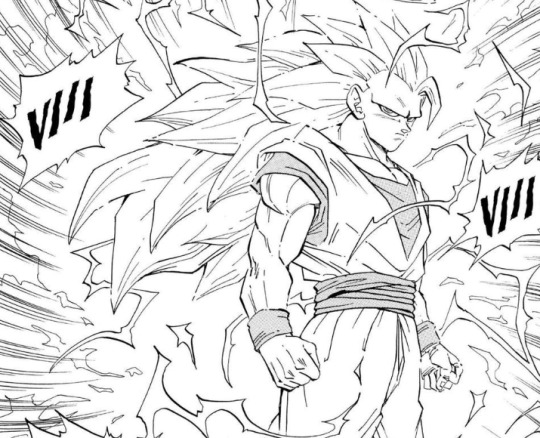
From the moment Goku broke this out, it was the shit. The ultimate of Super Saiyan forms (unless you'd seen marketing of Super Saiyan 4 because GT was already out by the time Z came to the West.)
Unbelievably powerful, to the point it could make short work even of Majin Buu.
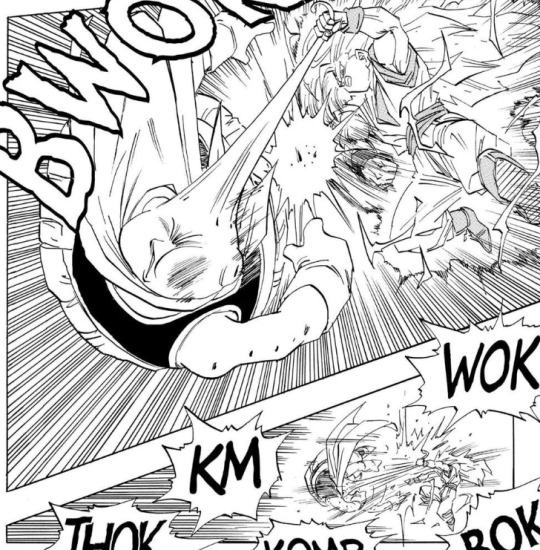
There's. Uh. There's just one problem. One teensy-weensy itsy-bitsy little problem with Super Saiyan 3.
It sucks.
More specifically, it's imperfect. Goku warns that it's a work in progress.
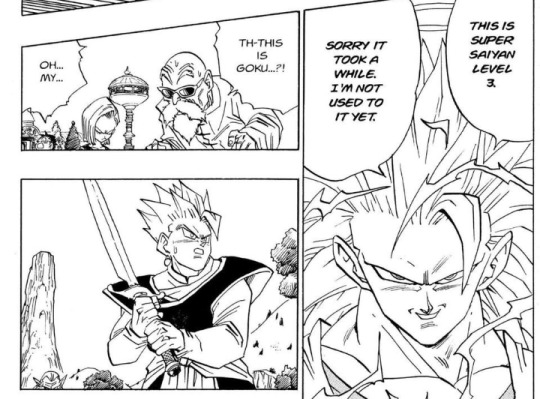
But for all the form's power, it's fatally flawed. Neither Goku nor Gotenks is ever able to accomplish anything with the form because of one critical weakness.
It's a weakness that the Super Saiyan has always had. In addition to heightened berserker-aggression and poor decision-making, the other key drawback of the Super Saiyan is that it bleeds ki - an effect that gets amplified when you break its limits.
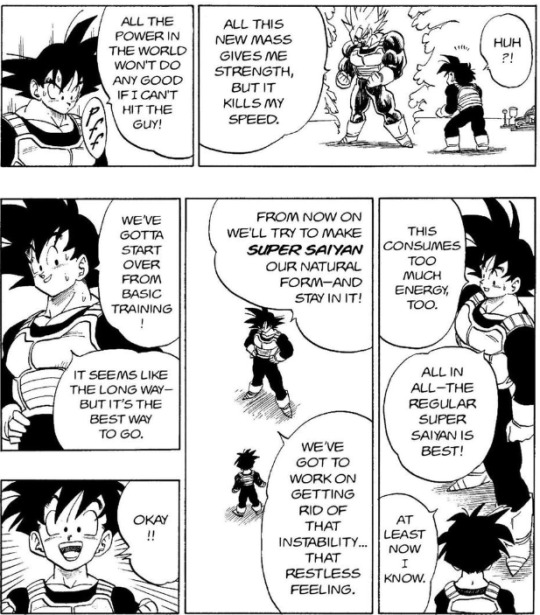
This is why Goku and Gohan gave up on breaking the limits of the Super Saiyan, instead opting to train their bodies to acclimate to the form instead. By training themselves to normalize the Super Saiyan, they eliminated its drawbacks - both the heightened aggression and the bleeding effect.
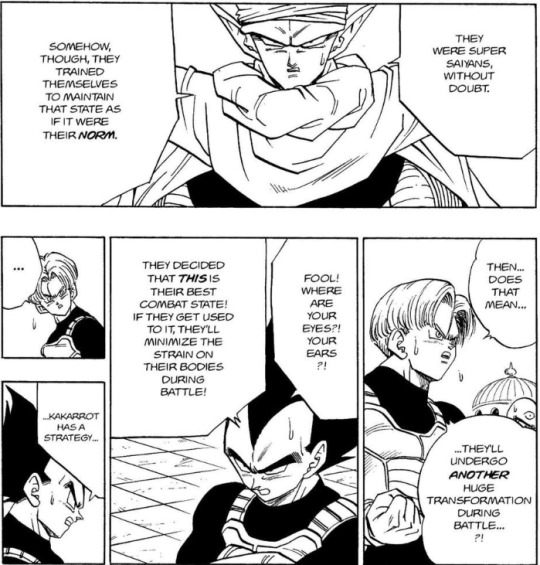
Ever the martial artist, Goku recognized that there's more to fighting than raw strength and chose not to step into the pitfall of "HAHAHA Look how HARD I can punch now!" that both Trunks and to a lesser extent Vegeta blindly ran into. Instead, he refined his technique and eliminated his weaknesses.
Which brings us. To the problem. Of him not having done that with Super Saiyan 3. By his admission, this is basically some prototype shit he cooked up yesterday that he hasn't had time to work the kinks out of.
Which. Is an issue. Because the kinks make themselves known throughout the arc. They make themselves very known. The biggest problem being that holy shit, this form bleeds ki so hard that it's basically useless.
The mega-amplification of the Super Saiyan's bleeding effect first makes itself known when it chews through the time Goku has on his free vacation pass from death.
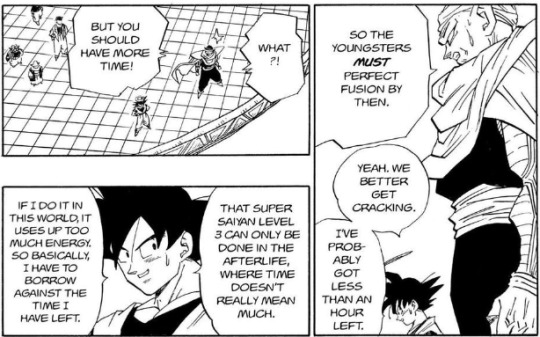
Goku initially attributes this problem to the mortal world itself. It's fine if you do it in the heavenly realms but it bleeds ki too hard if you do it on Earth.
Unfortunately, Goten and Trunks borrow this idea from him and try it out for themselves. It goes about as well. It's all fun and games, and they dominate the fight until the bleeding effect drains every last ounce of ki they have and kick them out helplessly into base form.
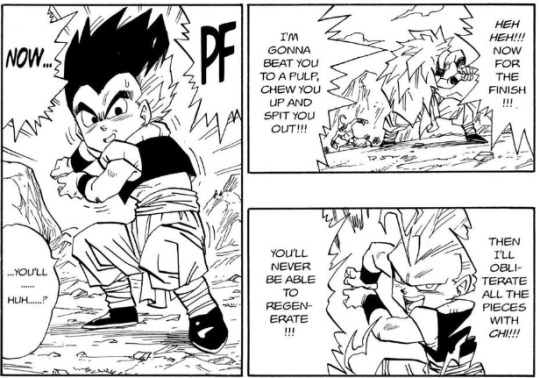
Which brings us to the form's main event. Confronting Pure Buu on the world of the Kaioshins, Goku's initially cocky that Super Saiyan 3 will waste him. He brags that he could have taken Fat Buu in this form if he'd wanted to.
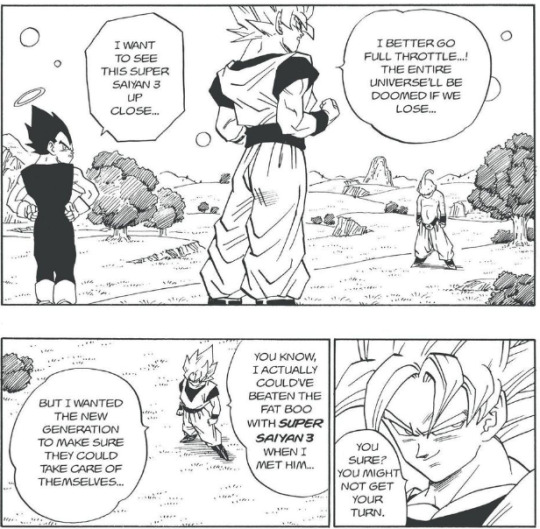
And. Like. Of course he's cocky. Why wouldn't he be? The bleeding effect is only a problem in the mortal world. They're in the heavenly realms right now. This isn't going to be a problem at a--
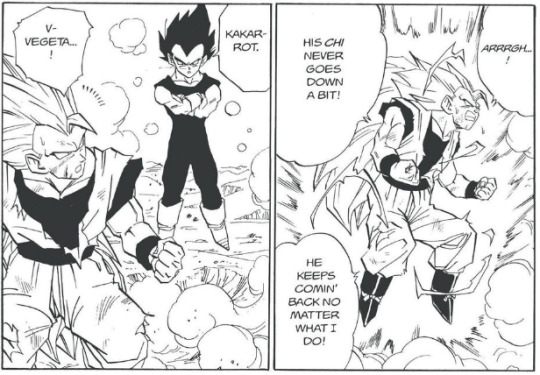
Oh. Never mind, Goku's having a hell of a time with Buu.
This is where the pop culture understanding of this fight takes a turn. It's commonly believed that Goku threw this fight because he wanted to let Vegeta have a turn.
That's. Not. What happened here. Rather, Goku's problem, or what Goku thinks is his problem, is that Buu's relentless assault isn't giving him breathing room to build his ki. He's having to fight constantly on the backfoot, unable to use the immense power of Super Saiyan 3 to its full potential.
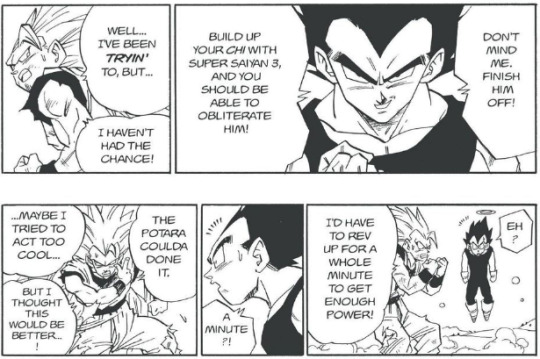
This sets up a Dragon Ball classic: Vegeta has to hold the line while Goku charges up enough power to wipe out Majin Buu with an all-powerful super attack. Vegeta throws himself into it with gusto.
But Goku miscalculated.
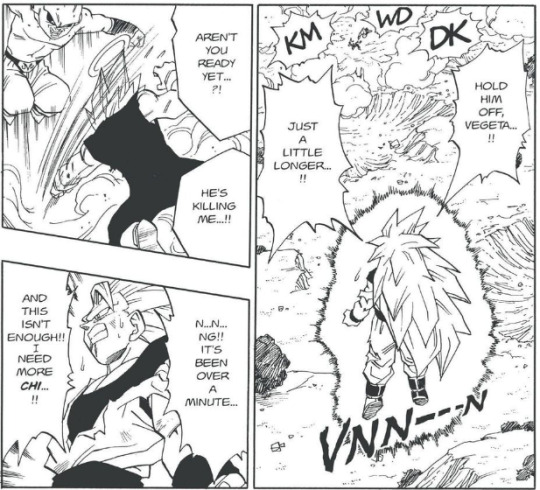
Even with breathing room to spare, Goku still can't build his ki. Because his problem isn't the relentless assault.
It's the bleeding effect.
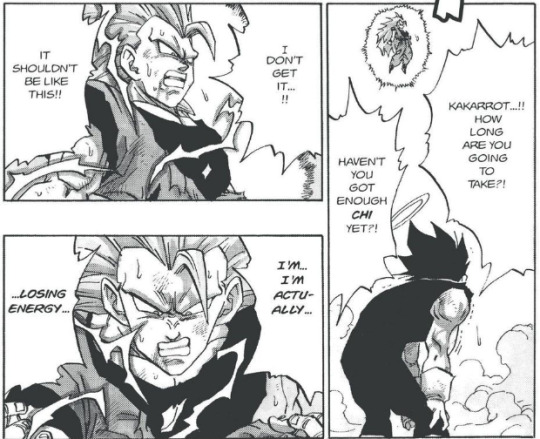
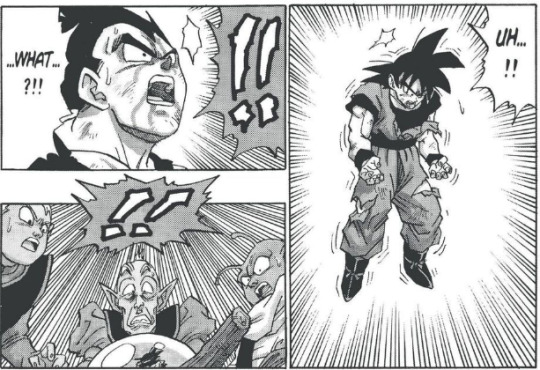
Because the problem isn't just that it bleeds ki too fast in the mortal world. It also bleeds ki too fast in a mortal body.
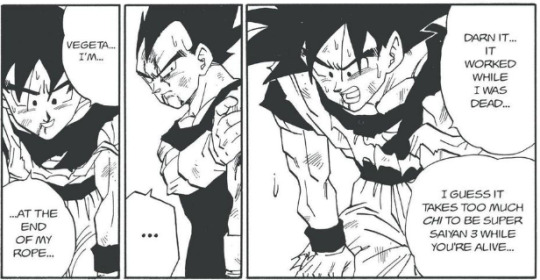
Goku never could have beaten Buu with this unpolished technique. He did not throw the fight. He gave it everything he had, and he failed. Maybe he could have taken Fat Buu with it. But even then, we only have his overconfident word for it and as we see here, he's vastly underestimated the form's drawbacks.
Super Saiyan 3 is a poorly-tested prototype that screwed every single person who ever used it. Goku was right when he said that the regular Super Saiyan is best.
83 notes
·
View notes
Text
so you want to care about nohara rin
excellent choice really really good choice she's a fun character. despite (or perhaps because of) kishimoto's writing, there's a lot to her character that makes her very very interesting. i like her a normal amount personally.
here are the canonical character traits we know rin has from her appearances in the manga and the data books: she is a mildly talented but not prodigious mednin. she does not cry easily. she is kind, intellectual, and devoted. she collects shells. her favorite food is strawberries. her favorite word is friendship. she acts in a way that suggests she has a crush on kakashi and is generally friendly but distant with most people.
there are a couple of basic questions that we have to answer in order to create a compelling nohara rin characterization. IN-UNIVERSE okay i know that the answer to a lot of these is "bad writing" let's take a watsonian perspective here okay?
1- if she is a mednin of no outstanding talent, then how'd she manage to transplant a sharingan perfectly in the field?
2- why did she confess to kakashi when she did and in the manner that she did?
3 (most important)- why did she kill herself like that? why did she kill herself on kakashi, specifically? we know that the seal stopped her from slitting her own throat, yes, but it didn't stop her from jumping in front of someone's attack, and there were a lot of other people present (pretty much all of whom were trying to kill her!) who she could have used to kill herself. even MADARA is baffled by her decision making here. pleased, but baffled.
dubiously real questions to answer (take place in the war arc and it's either rin's ghost or obikaka hallucination doing this stuff)
4- why did she tell obikaka to kill themselves?
5- why did she tell obito that she though everything he did was cool and fine? (see: obito's afterlife as horror for my personal take on a dual-read)
these are the main questions that a complex rinterpretation needs to address. obviously, i'm biased towards the rin that i've put together over the past. oh god it's been two years. um. anyways. but addressing those questions from a rin-centric perspective can help you build a character who's really interesting!
pitfalls to avoid falling into: treating her as perfect. she is not "the mom friend" or "the braincell" or "normal." she wouldn't make anything better if she took kakashi or obito's place. the fact that kishimioto dehumanizes her by making her perfect doesn't mean that you have to as well!!!
ok under the cut i'll go a little bit more into some of the main characterization i use for rin/frameworks i like to play around with. my rinterpretation. if you will.
i like to cut rin in half. there is the canonical, symbolic non-person half of rin that exists only in memory and was never alive to begin with and the fucked-up miserable nohara rin that's a person no matter how much she insists otherwise. doing this allows me to lean into their respective identities and also make them aware of each other! which makes them worse! (see: um. this. i promise it actually makes sense in the context of my characterization.)
a couple of frameworks i use to reckon with the symbolic half of rin:
schrödinger's cat is a great way to understand why nohara rin exists as dead the entire time. basically, before the the box is opened, the cat exists in a superposition of being dead and alive at the same time. opening the box isn't what kills the cat, though. when the box is opened to show us that the cat is dead, reality is retroactively re-written and the cat ends up being dead the same time. now imagine that this is about a girl committing suicide instead of a cat and also you get to see the cat's dead body before you even know the box exists. that's nohara rin baby.
eye framework is based around the idea that closed eyes represent dishonesty and open eyes represent honesty. unfortunately, even when being honest nohara rin cannot be understood, and so we must be unable to see her eyes to understand her because you can only understand something that doesn't exist by not looking at it. elaboration here.
the important things to keep in mind about this half of rin is that she does not exist, and if she did, she would be full of nothing (as opposed to empty). also, this is the only nohara rin that anyone has ever known. also, she's a time machine.
nohara rin, the person, is defined by her two fundamental and conflicting desires which are to be known and to remain unknown. she lies so so much and is rotting from the inside out and she kills herself because she is miserable and she does it like that because she is spiteful <3. well actually it's a little more complicated than that but this is already getting long i'll just direct you over to my rinfic if you wanna see how i characterize her on a personal level.
IN CONCLUSION:

14 notes
·
View notes
Text
Episode 1 Progress Update

According to timestamps it's been approximately 3 months since our last update. Embarrassing! This is why I'd never survive as a career social media person. Thankfully, the lack of updates isn't due to a lack of progress - we've been working on the game the whole time. There's just a bit of a story to tell there... you may have heard the phrase, "progress isn't always a straight line." It is a phrase that haunts the mind of every creative, but our contempt for it does not make it any less true.
This post is all good news, though! Keep reading for more details.
So, what happened?
As we said last update, after the demo we more or less jumped right into producing Episode 1. We had a clear vision of the common "beginning of story" pitfalls we were going to avoid, and our strategy for avoiding those. There was just one problem:

We spent so much energy avoiding them in our first pass of Episode 1 that we accidentally ended up ignoring what the story needed and recreating the issues we aimed to avoid.
Luckily, we had only wasted maybe a month or so on this version of the story. We knew it would cause delays, but we didn't want to write an update about it until we had a draft of Episode 1 that we trusted. An update that only reads "um... yeah we don't like it, we're going to do something else but we dunno what yet" doesn't exactly inspire confidence in a project, you know?
It is safe to say we have that better draft now. There are still many scenes to finish and editing passes to be done and bugs to quash, but this improved version of Episode 1 has made it through the uncertainty of development and I can say with confidence it is the version of Episode 1 you will receive.
Compared to the draft we burned, this one is much better suited to the twine medium. While certainly longer than our freakishly truncated first draft, the pacing is far more organic, allowing players more opportunities to play and make decisions as they are brought up to speed on the status quo of the setting and Quincy's place in the world at the outset. Though there is a lot of ground to cover, my hope is that it will be interesting in and of itself and not reek of "unskippable videogame tutorial."
With that out of the way, I'd like to address a question a few of you are probably thinking:
"Will these sort of draft rewrite delays be a common issue?"
Nope! We meant it when we said that our aim for future releases is smaller, frequent updates. The problem with Episode 1 is that it is a unique challenge to build and by nature cannot be a "small update."
There is no other point in the story (aside from perhaps the beginning of Act 2) that is going to be as fiddly as this. Episode 1 bears a lot of responsibilities that other episodes just won't. It has to be a hook for the main plot. It has to give readers enough information about the setting and how it works to understand said plot. It has to introduce a number of core characters. Toughest of all, it has to do these things competently enough that people who read it want to come back for Episode 2!
So, we kind of have no choice but to put in the extra time here. Them's the breaks!
In other news...
The delays on the writing end gave me more time to sure up the UIX and fix/pretty up some stuff I was originally going to let be. I won't detail everything I've done, but mobile users will be pleased to know there will be an adjustment slider for swipe sensitivity and all users will be pleased to know that the layout just generally breaks less in the coming version of the game. I've continued to implement user feedback and make navigation more intuitive where I can.
I've also prettied up some layout elements even though no one asked me to...

...and redrawn other utility art for the game. Look at this map! You can kind of tell what Vestur's landscape is supposed to be like now! You can hardly detect how much I struggled when deciding where the major rivers were!
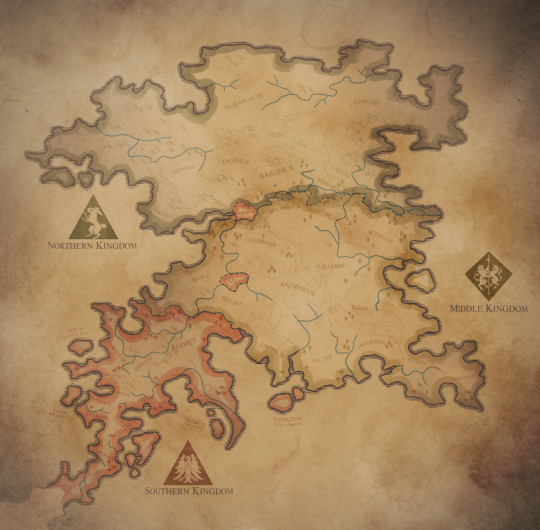
As we continue to lick Episode 1 into shape, we hope to share more specific tidbits with you all. If all goes well, the phase of development where we can show teaser screenshots is right around the corner.
Thank you for your patience!
-LS

37 notes
·
View notes
Text
Buck Week 2025 - Spare Me The Heartache
@buckweek Prompt - Defective Parts
When Connor and Kameron out Buck's secret plan to be their donator, it reveals a bigger issue for him that Bobby helps him out with.
AO3
***
Buck has a problem.
It’s not exactly a problem… it’s more like a fear.
He meant it when he told Connor and Kameron that he wanted – wants – to do this donation for them. It’s just… there’s something stopping him.
Sometimes, it’s shift, but he has two days off between shifts and not all of them ended up on the weekend. So, those weekdays that he could make it … why couldn’t he bring himself to do it?
It was like any time he headed that way, he’d get distracted or sees something that gets his attention. And before he knows it, it’s too late.
Then, he started to really focus on doing it only for a run of terrible luck – getting off shift and traffic, his car breaking down, and people showing up at his loft or calling him for help (and what was he supposed to do, not help?).
And now everyone at the firehouse knows and it’s just … well, they’re not exactly encouraging.
Hen already knew and she pointed out the pitfalls, despite the fact that her son is adopted.
Chim had already told Maddie about the crazy thing Buck’s doing now and he’s got a dozen texts that imply it’s some sort of joke or, at least, it should be, because it’s too crazy to be a serious possibility.
Eddie had gone on and on about how weird it would be for another man to raise Christopher, despite the fact that he’s been trying to find a stepmother for Chris, he just can’t see it making any sense to give up his own DNA like that.
There had been a debate in the engine that had only ended when Bobby stated that it was Buck’s choice, and they shouldn’t comment on it.
Oddly, he had not commented himself.
Though he has been sending him concerned looks ever since the discovery, but he has shut down any time someone tried to talk to him about it. He seems determined to let Buck keep some semblance of privacy that was kind-of blown up by Connor and Kameron.
He’s kind of mad at them for it, but he’s also so confused.
How could he have made up his mind and then… not be able to do it?
It feels like there’s some sort of bubble or force stopping him from doing what he planned to do.
And he can’t wrap his head around it, like, at all.
So, he grabs his laptop to do some research – research he probably should’ve done a month ago when he agreed to this.
He doesn’t get very far into it before Bobby appears at the top of the stairs. “Couldn’t sleep?”
Buck shrugs. “Lot on my mind.”
“No one’s been bothering you, have they?” Bobby asks, as moves to the kitchen to make tea or coffee. Probably coffee.
“Nah, you shut ‘em down pretty quickly.”
“Yeah, but I don’t see everything.”
“Everyone’s been fine,” Buck assures him, still looking at his computer.
Bobby hums. The pot begins its work for coffee.
“And you? Have you been fine?”
“Of course. I – I am…” he pauses and looks up to see that concerned look on Bobby’s face. “… not fine.”
“Do you wanna talk about it?”
Buck shrugs, but he moves closer to the island. “I – well – are you going to judge me for it or can you be neutral?”
“I will be as neutral as I can be. Can’t say there isn’t a part of me that’s worried about this choice, but it is your choice, and I will support you whatever your decision.”
That’s probably the closest he’ll get to neutrality, so he explains about the request and how he feels like Connor brought him home and gave him a family and he wants to do the same for him, but something seems to be standing in the way.
“… I just – I can’t understand. I made this decision, I told them I would do this, but every time, I make my way there to donate, I’m like … distracted or something physically gets in the way. Once, I was in the waiting room for my turn when I just – panicked – and left.”
Bobby hums, and listens, but doesn’t respond or say anything.
So, Buck keeps talking.
“All I kept thinking while I was sitting there was about the babies on the wall and how – how I wouldn’t want any of them to end up like me, and like, you know, Connor would never do that, but I haven’t exactly seen him in years. And sure, they’ll be good parents, but it’ll be obvious that the kid isn’t biologically related to him and what if the baby starts asking questions and they tell him about me and then it like triggers him to be like my parents – I can’t – I don’t want my kid – not my kid – to ever feel the way I did growing up.”
Bobby opens his mouth to respond but Buck’s on a roll.
“And ignoring all that, what if I can’t even father a kid, either? What if my defective parts that failed Daniel fail Connor and Kameron, too? What if I let them down after all this time and then, I don’t know … I just … it’s not – I was ready… I made my decision… but every time something gets in the way, I think it’s a sign.”
He finally takes a breath, shaking his head to clear it and accepting the cup of coffee made just the way he likes it.
Bobby takes that moment to speak.
“Buck, I say this will all of the love in the world and trying to be as neutral as possible – it doesn’t sound like this is the right thing for you to do. You’re an amazing man for wanting to do this, it makes complete sense that you want to pay it forward in a way (to Connor for helping you find a home), and if it wasn’t for the, uh, situation, you grew up in – I wouldn’t hesitate to support the decision to help your friend have a family, but the fact is that situation does impact you and your decision.”
Buck opens his mouth to refute him, but Bobby isn’t having it, holding his hand up.
“You can trust Connor with your life, but there’s always going to be a part of you that is going to look at a kid and think I hope that they didn’t grow up like me and if that kid is your biological kid and you find out later on that Connor wasn’t as trustworthy as you thought, it will break you – not just your heart, but you. One hundred percent. And I’m not saying he will – I don’t know him – but I do know you and you’re not going to be able to get over this… you will always worry and if actually happens…”
Bobby trails off and puts his hand down, but then, a second later says, “And you do not have defective parts – if you can’t have a kid either, there’s nothing wrong with that.”
Buck lets his words wash over him.
He’s right.
He knows it. Bobby knows it.
Bobby’s usually right.
And it makes sense.
Yes, part of him was afraid that he couldn’t conceive a child either, and he’d let them down with his defective parts, but he knows, logically, that’s not it. It’s not enough to stop him from doing this.
The truth is… his fear is deeper than being defective.
He … trusts people just fine, maybe too much, and most people in his life have let him down one way or another. Even his family at the firehouse.
Even though he’s gotten passed it, it’s not like he fully trusts certain people, either… and if he can’t fully trust them, then…
Yeah, how’s he supposed to trust Connor not to end up like his parents? Unable to truly love his kid because biologically it’s not his?
He feels guilty for thinking that, but if his parents could be biologically related to him and still pull that shit … it would be hard to trust anyone not to do it…
And the fact is… he can’t let a child biologically related to him potentially go through that.
Maybe he could work through safe guards – be Uncle Buck or something – but it would never be enough to make sure that his kid ends up happy and loved.
Buck looks up from his cup to Bobby, who’s pretending like he’s not watching him carefully.
“I just wanted to help, you know? But you’re right, I – I think that might be it.” Buck shakes his head. “I – I should’ve realized after the panic attack.”
Bobby hums. “I think that was your body’s way of letting you know that you can’t logic your way into this. You have to truly want it.”
Buck hums. “I thought I did, but I also think… that there’s a part of me that thinks that how I feel, what I really want doesn’t matter. That I was put on this earth to serve others – spare parts, you know? And this, it fits into all that. It’s not a lung or kidney… it’s sperm, what’s the big deal, right? It’s not like I’m using it.”
Bobby looks like he’s trying not to laugh at the last bit. He coughs and then says, “Well, this time that sperm was going to bring a new life in the world, and it’s okay that that is complicated for you.”
Buck nods. “Yeah, I just … how am I going to tell them?”
“Gently, but firmly,” Bobby states. “And I know they probably don’t know about Daniel, but maybe… if you wanted, you could explain that, but frankly, you don’t owe them an explanation. It’s not like you had a contract or anything. And if Connor’s really your friend, he’ll understand.”
Buck sighs. “Thanks, Bobby. You’re right – and if he doesn’t, well, then, he wasn’t the friend I thought he was.”
“Exactly.”
They fall to comfortable silence, Buck’s mind no longer buzzing and he knows… this is the right decision.
And he hopes that Connor and Kameron will understand.
And if not, he’s always got Bobby and that’s all he needs.
#buckweek2025#Defective Parts#evan buckley#evan buck buckley#with Bobby Nash#Bobby Nash#Buck & Bobby
11 notes
·
View notes
Note
hi! can i request Taylor Swift Mixtape Prompt #45 - Clandestine meetings and longing stares with Beau “Cyclone” Simpson please? Thank you! 💕
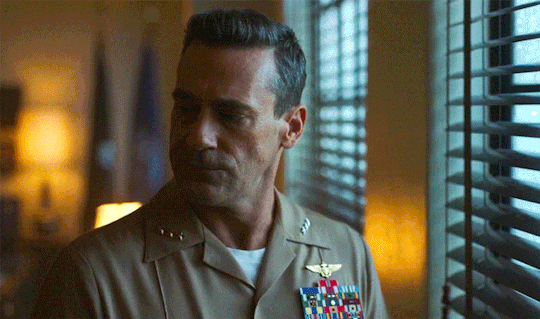
The First Time Series:
The First Time - How it starts.
Patience (NSFW) - Beau takes his time with you.
North Carolina - A car accident leads Beau to ask an important question.
After that first night Beau and you keep your relationship quiet.
You both understand the pitfalls of dating a superior officer. It doesn’t matter that you work in different divisions, that you’re highly commended and well accomplished, it’s you that will catch the flack.
Ambitious, they’ll call you.
It’s a veiled word for bitch or slut.
Beau fucking despises it.
It’s the times he runs into you on base that Beau finds the hardest because he has to resist the compulsion to reach out for you, to touch you. He has to pretend that he doesn’t know what it sounds like when you’re in the throes of passion, that he hasn’t left love bites underneath the collar of your shirt.
It goes on like this for over a year until you have to make a decision about your next posting. He tries to give you a little space because it’s a difficult choice, you could go anywhere in the world, and he doesn’t want to be the reason you make a decision that you regret.
“Victims Support Services.” You tell him one night in a hotel room in San Diego. “It’s close, on base…”
“Ally,” He says softly as he turns to face you. You’re sitting up naked in bed, the sheets covering your assets as your back rests against the headboard. “I’m being deployed to Germany next month.”
“Oh.” You say and something in your heart just breaks because you’ve done something you’ve never done before, you’ve started to plan a future, you’ve put someone else ahead of yourself.
You say nothing as you slip out from underneath the sheets and head into the bathroom. You turn on the shower, the heated water raining down on you, drowning out all the noise in your head.
That’s how you learn not to choose love over your career, that duty must always come first.
@kmc1989 @justameresimp @agentorange9595 @handsupforamiracle @lxaah11 @librarian1002 @imaginecrushes @flrboyd @areamir @nani-kenobi @b-bradshaw @adaydreamaway08 @crimeshowjunkie @shepgurl @inkandarsenic @caffeinatedwoman @tortilla-maria1 @lemmons1998 @dr-alan-grantler @burningpeachpuppy @penguin876 @deliriousfangirl61 @goosterroose @kishie8 @s3lz454 @skyesthebomb dizzybee03
98 notes
·
View notes
Text
ALSO while we're on the topic of audiences and editing: i made some irl comic friends and they're both extremely Colorado Art School Kids, and my own storytelling education is "angry weird child trapped in appalachia making art out of necessity" so we run into a lot of fundamental differences in our approaches (WHICH is good and fine actually! i'm Learnin stuff). One of the biggest ones is oh my god, holy shit, creators have GOT to interact with audiences more.
One thing my Very Seriously Educated Comic Friend keeps wanting to help me with is that kc tends to be harder to parse because I don't hold the audience's hand, which y'all know is a thing I angst about a lot for various disorderly reasons. He's right! There are a lot of places I could improve in that regard. Mechanically. There's nothing for it as far as actual content goes; Kidd Commander deals with a lot of nuance and abstract concepts and there's not much to be done about that without compromising the story, which I personally won't do, so I've accepted it's better to lean into it rather than worry about appealing to a bad faith audience.
When I tell him this, that there's little sense in trying to dumb things down because there IS no point where that will work any better than it does now, we usually argue (like, the way that you argue about art over coffee). He thinks the goal here is much closer than it is, he's proposing a quick detour to the gas station instead of trying to land on the fucking moon lmao. It is. So SO clear that he (and most storytellers I talk to tbh) has only ever discussed storytelling with other educated artists and not the majority of actual comic readers/media consumers, who have never engaged with media analysis in their lives. Even when he's trying to discuss the theoretical Common Denominator Reader it sounds like this
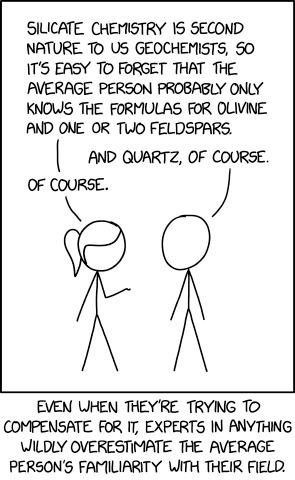
When I quit interacting directly with The Webcomic Ecosystem for my own health I made the conscious decision to immerse myself into the reader side of things, specifically BECAUSE there are always going to be more Readers reading me than other writers, and I feel like that feedback is very valuable. I also want to understand another perspective that is different from mine! It's certainly got its pitfalls but there are a lot of positives that come from this and I do recommend it if you've got the stomach for it. I genuinely think one of the things that has improved my work and my relationship with it the most is spending a decade reading feedback from people who will never, ever, ever understand comics more complex than instagram pop psychology strips. Or relatives who don't understand how sequential pages work, or people who watch youtube Ending Explained videos, or readers who don't know what to do when a protagonist makes a bad decision. I ALSO went to school for storytelling, I was primed to have this exact problem and I did for a while. But being brought up isolated in a creative wasteland irl AND jumping directly from academic media analysis to the fucking webcomics reddit did a great job burning away a lot of that lmao. WE'RE the weird ones for writing papers about books, or caring to learn enough to create functional stories; this is a WEIRD WEIRD THING we are doing and it's important to know that so you can make informed decisions about your creative actions. Read the comments, be horrified, adjust expectations accordingly.
#still kinda finishing all my processing about this after fanexpo tbh#i have a lot of weird feelings about growing up in the south then coming here where things are so much easier for artists#jealousy is certainly one of them BUT this is definitely an aspect i'm grateful for
13 notes
·
View notes
Text
Illusion Of Life!

You are this beautiful being that is hidden within this gross and dross body of bones, skin and blood. You are truly a Magnificent Being of pure Light and Love, who has a mission in this world separate and different from all others. You have to come to conscious awareness and understanding, consciously seeing, knowing and understanding that you are more powerful than you can ever know or realize. You have this power within you to create life as you want it to be, enjoying ecstasy and bliss, but yet you are held responsible and accountable for every choice and decision you make, knowingly or unknowingly, consciously or unconsciously. So, you are saddled with the responsibility of deciding which path of life and life experiences you will undertake - the path of the mind or the path of the heart, or will it be - the way of power or the way of love. Life then is a school where you undertake lessions in the ways of life, to help you come into conscious awareness of who and what you are and for you to choose which way of life you want to go.
Each path in life is neither good nor bad, but a demonstration and training for you to see and understand the duality of life, and what one state of consciousness is in relation to the other. How do you understand success if you haven't experienced failure? How do you know True Love if you haven't experienced Heartbreak? How do you know Happiness if you haven't experienced Sorrow?. That's why this world is set as it is, so when you are in the days of sorrow, anguish and misery, be patient and preserve, for the days of happiness, joy and gratitude are at hand. When you are in a dark tunnel of life and life experiences, be patient and hopeful for the light to herald the end of the darkness, for the beginning of a new dawn and day is just ahead of you, look yonder and see the light and rejoice.
Your perception of life and life experiences is what creates all of your thoughts and emotions, giving rise to the conditioned mindset that is controlling your reality and existence. You aren't meant to be confined by your myopic, limited and conditioned perception of life, for you are limitless and boundless when in your true essence and divinity. Your essence is boundless, beautiful and ever-unfolding. The weight of your thoughts and expectations hold you captive and spell bound to your mindset, and it's attendant narratives, stories and drama of your life and life experiences. Releasing the weight of your thoughts and expectations woven from your low state of consciousness and mind, allows the infinite within you - the divinity to emerge in its purest form. This is your Higher Self which is your authentic self, waiting to connect with you and show you the truth about yourself. It will guide you firmly over the many illusions and pitfalls of life, and show you the easy path to freedom and success but only if you let it. You can bring it into manifestation by disconnecting from the mind and reconnecting with the divinity within you, opening yourself up to it and letting it take back charge of your life and life experiences.
True liberation and freedom is not found in resisting the illusion of life because the illusion has a purpose, but it is found in transcending this illusion and recognizing it for what it is, and the fact that you are above and beyond all illusions. You then come to the knowledge, realization and understanding that nothing external has ever truly bound you, even though the mind has led you to believe otherwise. When you finally align with the infinite within you, this great power, the divinity within, you come to see, know and understand beyond the distortion of mental images and processes by the mind. Your reality and existence becomes an open expanse of pure Light and Love, an energy field where creation flows unhindered and consciousness itself which is who and what you truly are, radiates in its fullest expression. You become the "I am That I am" more powerful than you can ever know or imagine.
More to come.
#mind control#mindfulness#mindset#positive mental attitude#self care#self improvement#healing#inspiration#psychiatry#psychology#psychotherapy#self love#love#healthy lifestyle#heal#health and wellness#mental health#healthcare#health & fitness
6 notes
·
View notes
Note
Hello😊/
Can you, please, post about the differences between ESFJ and ENFJ?
As much as I read and even "understand" the difference, I'm having difficulty typing my mother (I'm talking to her about the Fe type based on von Franz's book and she is even identifying with the inferior Ti). I was almost sure she was ESFJ, but now I'm a little doubtful. Thank you very much!🙏🏽
Hey, thanks for reaching out! Thanks for being patient on this, hopefully it is helpful!
Short disclaimer: I haven't read von Franz's book, so this may not address any specific points of confusion you have about her book, but I was able to dig up a few excepts to give me an idea of the kind of perspective she takes when analyzing all of the types with respect to their inferior functions.
ENFJ vs ESFJ: What's the Difference?
So ENFJ and ESFJ are both Fe-dominant and Ti-inferior types with respect to the order of their cognitive functions. So if your mom is relating to the inferior Ti experience that von Franz outlines (being vulnerable to lashing out when their internal logic is being criticized), then you've definitely narrowed down your options, as you already know!
So the difference between the two lies in their auxiliary and tertiary functions. You mentioned that you were almost sure she was an ESFJ, so we'll start with that!
ESFJ: Fe-Si-Ne-Ti
The Si-Ne axis is the ESFJ's preferred perceiving axis. General characteristics include feeling more comfortable working with practical information to make decisions. Because this is Si we are talking about, it is best if the practical information comes from a source that has a lot of backing/support behind it, especially anecdotal support. This is because introverted sensing is a subjective perceiving function, so it tends to like hearing about other people's real, personal experiences to make decisions.
On the other hand, having a lower, lesser developed/controlled intuition function like Ne would make her prone to perseverating about all of the hypothetical possibilities that are out of her control and cannot be predicted by her Si (her "tried and true" methods). Because Ne would be the tertiary function and not the inferior, however, she may indulge Ne in small and inconsequential ways like enjoying a sense of humor that appears random and "out-of-pocket". She could also enjoy games of chance, obscure references that appeal to very small audiences (that she is a part of), or she could maintain an eclectic collection of unique trinkets.
ENFJ: Fe-Ni-Se-Ti
The Ni-Se axis is the ENFJ's preferred perceiving axis. General characteristics include feeling more comfortable defining an abstract, personalized, idealistic / optimized outcome with Ni, and trying to actualize it through action with Fe. Instead of the "tried and true" method of Si, Ni likes to define what would be the most effective hypothetical solution to a problem, and get as close to inventing it as they can. Bonus points if the solution is so effective, they can make it a universal solution to multiple problems.
ENFJs having a lower, lesser developed/controlled sensing function like Se would make her prone to freezing/delayed reactions situation that need a quick fix right now. Se is all about taking in the information that is readily available here and now, and having a preference for Ni would make her struggle to accept solutions that are "good enough for now" when she thinks that there is a better one to be had and she could make it happen if she just had more time. Because it would be her tertiary and not her inferior function, she might indulge Se in low-stakes situations like shopping, sports, photography, anything that engages her natural 5 senses in a fun way.
Additional Thoughts
You might be able to say that Ni is the function that originally invented the "tried and true" solution that Si craves. Even if that were always true (which it isn't), you each function has their own personal pitfalls when it comes to perception. Si might rely too heavily on how things have always been done and might not think outside the box enough, and Ni might focus too much on an ideal, personalized solution that they never accomplish anything because they have no resources to actualize their ideals, or they just reinvent the wheel, when they could have just relied on the information that was already there like Si tends to do.
Sometimes, I find going back to the basics between Sensing and iNtuition to be even more helpful than doing a deep-dive on the differences between Si and Ni, or Se and Ne. This is because having an auxiliary introverted perceiving function followed by an extraverted perceiving function in the same places of your function stack can present some similar advantages and challenges, even if their dichotomies are reversed. This may sound very iNtuitive of me, but sometimes a big-picture, bird's-eye view is most helpful to me. Understanding if your mom is more interested in gathering practical information (Sensing) or pondering abstract ideals (iNtuition) might be more pertinent (and easier lmao) in determining her type, if you've already narrowed it down to ESFJ and ENFJ.
Conclusions
Definitely let me know if I should elaborate on anything, or if this was helpful. And if it was helpful, let me know what type you decide your mom is!
#mbti#mbti personality types#mbti types#mbti personalities#16 personalities#enfj#esfj#ask#ursulawhosoever#queue
11 notes
·
View notes
Text

Family Ties ⛪️ - May 2024 - Capricorn
Overall Energy: 9 Swords rev
I’m seeing what one might call the “stereotypical” life of Capricorn, and I don’t mean to be insensitive at all, but y’all often come from drama, issues, tragedy, addiction, sometimes the worst of the worst circumstances - which is why The Devil is Capricorn’s card. Do you feed the toxicity and adopt it as your own, being an earth sign of “legacies and tradition”; do you continue feeding mindsets and habits that don’t allow you to grow; are you going to allow yourself to rigidly control and obsess over how things are done…or are you going to release all of that bs? You wouldn’t be the GOAT 🐐 if you didn’t have to overcome some bs on the way to the top. Saturn is not easy but always gives to those who do the work, and if anyone knows about Capricorn, that’s literally your M.O. in life. Any Cap placements really.
Where is God going to put *the* most solid mfer in the zodiac, in a home with other solid people? That would be nice! But no, with people that make them grow tf up really quick, because Capricorn knows there’s nobody on this whole damn planet that’s going to do it except themselves - and that starts with family. That’s where you’re at with all of them, I don’t see a particular connection (yet) that’s very close. I don’t see deep bonds. I see hard lessons over a lifetime. If anything, you’re finally at the point to where this doesn’t stress you out anymore, you don’t worry and try to manage every little thing for everyone. You realize that you weren’t dealt the most fortunate hand, and life is unfair, but what can you do? Walk away. You feel like you don’t have a choice.
Mother: 5 Cups & The Fool
Oracle: Harmony ☯️ - Sun Libra
6 Habits
Examine habits that may impede the pathways to your goals and encourage beneficial ones.
Mom has the healthiest relationship with you that I can see right off the bat. I’m seeing issues with masculine energy in your family, I don’t know if that’s a gender thing with you, you could just get along better with women, regardless of your own gender.
Mom knows you inside and out, she knows your habits and isms, she knows your pitfalls and strengths, and she’s upset by the decisions you’ve made (again?) I don’t normally see this with Cap, but in this reading you’re coming off as very impulsive. You just up and decide to do shit, and they can be BIG things, but you don’t include her…don’t plan, don’t make it a big enough deal, don’t give people room to comment or even help you. She sees you as behaving to extremes, either not at all or ALL IN, and there is no telling which side you’re going to go with on any given day.
You’ve done something suddenly, impulsively, it’s something you are/were excited about. Could be having a baby, proposing, moving in with someone, moving across the country for someone - it could be extreme or sudden in this person’s eyes. Whatever it is, your mother’s feelings are hurt and she wished you didn’t do this - because whatever it is, it’s not the first time. The Devil shows up with The Tower to clarify a cycle that keeps repeating, maybe not ending well, and she expects it almost but she’s disappointed - because whatever you decide affects her, she cares. For some that’s entirely unconscious to you - and with the initial energy, it could be aspects of yourself that needs to balance these scales, rather than defending why you repeat behaviors . High Priestess at the bottom shows you already intuitively know what the issue is, and what to do about it. Or you could act secretly on purpose, because you know how Mom will respond. The vibe is she’s looking out for your best interest.
Father: King of Swords rev & The Chariot rev
Oracle: Quarrel 🤬 - Mars Cancer
Authority 👨⚖️ - Mars Capricorn
Dad is at the root of your issue with family, you two are night and day. Mars shows up in opposition - whether the signs are legit or not - it shows a major lack in understanding on both people’s end. Both of you simply would not approach situations in the same way, your motivations and drive are completely different, and how you express anger, or chase your desires, aren’t compatible. But you both may be rigidly holding your stance that each person’s side is the right one. Both are probably true, considering each person’s viewpoint and character.
So what can you do when a parent is your opp? Silence. That’s what you’ve decided. You may suspect Dad of narcissistic traits, could be, he could also just be an asshole, King of Swords rev is someone that condescendingly knows everything and does not mince words in letting you know how stupid they think you are. You and everyone else. There can also be a major lack of understanding and communication with this person, they couldn’t understand you if they tried - because you’re silent - but would they even bother to try if you did? That’s the question 💯 So rather than beat your head into a brick wall hoping for Dad’s approval or understanding, Originality shows you being confident in going your own way and doing things how you feel is right. And you’re not wrong for that. Both of you could feel confused as to “how it got here.” Like things could’ve been handled better.
One of you approaches conflict emotionally, sentimentally, projection and jumping to feared intuitive hints, reading too much into shit - and the other is very cold, black/white, I’m right you’re wrong, it is what it is - both extremes irritate tf out of the other person. It feels like it’s possible the bridge between you could be mended, for some, but not if you both immediately show up as opposition. And right now, Dad shows up reversed so, he still thinks he’s right about everything. You’d know best.
Siblings: Knight of Cups rev, King of Cups rev, 9 Wands
Oracle: Flattery ☺️ - Venus Gemini
60 Patience
Creativity takes time, and sometimes a project can seem to be taking too long or seen to be failing.
Yikes. I’m only getting one, doesn’t mean there’s just one. This person is a Grade A, top level manipulator, and they always have been. From child to adult, this person has always known how to Flatter, guilt, cry, romanticize big ideas with no substance, and otherwise swing things in their favor; how to emotionally coerce people and charm their way through life and getting whatever they want. You could be one of the only people who truly sees through this person’s bs, but you absolutely do 💯 Especially when you have two parents that seem to be on your case about every decision you make or don’t - and this sibling tends to get away with murder. They could be “the baby”. Or all of this could be switched - and that’s their perception of you.
Assuming it’s them, I see you being highly guarded against this person and their ways - but you don’t cut them off either. You’re actually very patient with them and seem to attempt having a close connection with them despite your heavy internal judgments - and assuming that everything that comes out of this person’s mouth is pure bs. Which Spirit is kinda giving you validation on that, you’re not wrong. You seem to think they’ll change. They have to, right? I do know that without spirituality, extremes, or some really major situation happening - by themselves just living life - *most* people don’t change. Doesn’t mean they can’t but…I wouldn’t hold your breath. In some cases, you keep this person at arm’s length just to have them around. If you can continue just accepting that this is how it is, and that it may never change, do you boo.
Grandparents: 3 Pentacles & The Hierophant rev
Oracle: Fortune 🥠 - Sun Leo
47 Enchantment ✨
We are enchanted when the Muses sing the Art Spirit into us.
To you, the grandparents are those people that will bust you out of jail and not even tell your parents - that’s how it’s coming across. They’re not strict, rule following, “my way or the highway” type of people, no. In some sense they’re showing up as enablers - however that applies to you, and/or your sibling/s. Their motivation for doing it is so you or they don’t end up in a worse position though, they fear the worst when it comes to…maybe some decisions that have been made or binds you have been in. They don’t want things to be unsalvageable. These could be Dad’s parents, or Mom’s just knows him well, and they recognize how he is with you, maybe they feel they understand you in ways your father can’t or refuses to. I don’t get that they *like* being the rebels, but they’re not going to let you rot in jail to “learn your lesson” either - which is more Dad’s energy.
With that though, particularly a grandmother could be a magical…I’m hearing “pixie-like” person. Small/short, young features, clever and mischievous, they’re a hoot to be around. They may believe in oddball things or like…I’m seeing a whole house filled with plants inside, but nothing going on but weeds in the garden. “Keeps out the crazies” 🙃 She could be an oddball for sure, but you don’t mind, because there’s something about her energy that makes you feel energized and hopeful about life being what you could make it. Hell, she’s happy 🤷 Even if you’re nothing like her, you love her weird yet open way of approaching situations, and her probably funny perceptions of things that wouldn’t even occur to you - as Capricorn too can be very black/white and “it is what it is.” Grandma shuns the system & believes in magic - but isn’t a religious person - she is just her quirky loving self and owns it with confidence. You may not like to know that she sees your father in you, in a similarly bull-headed kind of way - and it makes her sad you’re both opposed rather than close. I’m seeing the grandma from Moana saying “I’m his mom, I don’t have to tell him anything.” 😆 I freakin love her energy.
Spiritual Ancestors/Guides: 7 Wands & 4 Pentacles
Oracle: Empathy 🤗 - Moon Pisces
Innovation 🤖 - Jupiter Aquarius
28 Evolve
Creative ideas evolve out of the invisible and profound nothingness of preverbal consciousness.
33 Perfectionism
Be content to know perfection as a distant utopian goal to which we journey but never arrive.
I’m not sure how Spirit is telling you to handle your family, it’s going to be different for everyone. I am simply seeing that taking a rigid & defensive stance, guarding your interests and decisions from the input or guidance of everyone, stubbornly keeping things close to your chest and currently being in a stance of reacting rather than taking action - these aren’t the things that make you happy. It won’t bring happiness to you. Could be learned behavior, especially from the father. In having conflict with him, you may have learned to meet him at his level, which subconsciously shows you may be acting in the same way that you can’t stand about him! Just…about him. About others. And so would continue a generational curse of narrow-minded thinking and a particularly toxic cycle, whatever that entails for you, which is being shown you have the power to both recognize and break. Because you’re here, so you’re at least somewhat interested in this stuff 🙏
Jupiter Aquarius and Moon Pisces both encourage you to step outside of yourself and your own experience, in order to gain clarity & truth, and showing empathy towards those that would come against you or judge you. Don’t be like them, see them honestly (as much as you can), and feel for their situation. That isn’t the same thing as forgiving them and allowing them back in though. You can keep people at arm’s length to protect yourself, if that’s what’s known to be necessary, while also recognizing where we may be projecting our own defensive energy in situations where it’s uncalled for. Or even where others are doing this to US. You can only control yourself own reactions, your own feelings and judgements - and what other people do is not your problem. Send them love & light and let it go, truly, not just clinging onto old resentments and anger that just festers in your brain like a toxic wound with no healing. You may be similar, but you are not *just* like anyone, you can and should be better, having learned more, having evolved in a later generation with people who are doing the same thing every day - and openly honest about it. Finding others could help you - a tribe of generational curse breakers. The more you feel understood by others (empathizing with you) - the less you need be concerned with one person’s opinions, behavior, or judgment.
#Capricorn#family ties#may 2024#family#astrology#zodiac signs#generational trauma#generational healing#karma#legacies
8 notes
·
View notes
Text
CHAPTER 2: MOOD PITFALLS TO WATCH OUT FOR (Pt. 2)
A summary of the book Why Has Nobody Told Me This Before? by Dr. Julie Smith
In my previous summary, we discussed how our feelings affect our behavior which lead to a more vicious cycle. Now we’re going to talk about thought biases that we generally experience since our thoughts and feelings go both ways.
Thought biases are more likely to appear when we’re feeling unwell emotionally. To simplify, thought bias is our mind’s way of thinking in a simple and quick manner to process and interpret information based on our prior experiences and views. This way of thinking would likely distort our understanding in thinking that can result in making bad decisions and mistakes. Thus, we have to understand and notice these thought biases so we could limit their power over our mind.
Here are several thought biases we have to learn:
Mind Reading
“Someone just laughed my way. I must look funny.”
“I must be so boring that they left me on read.”
We tend to spend much of our time making guesses about what others think and feel. Those thoughts likely happen when we’re struggling with our emotions. To ease those uncomfortable feelings, we tend to need constant reassurance; however, when the reassurance is lacking, we assume those thoughts are true.
Overgeneralization
Have you ever felt that everything seems to be wrong one thing after another? That is what overgeneralization bias feels like. You see one bad thing as a sign that the other thing will also go wrong.
For example, you might think your relationship would never work after one bad breakup. Or, you fail a job interview and assume you would mess up the next one too. You just feel hopeless and don’t see any point of trying again. Not only in this kind of situation, something trivial like a spilled milk in one morning could also affect your feelings for the rest of your day. It’s normal to have those thoughts, but it’s not helpful to dwell on them. Doing so only adds to your pain and worsens your low mood.
Egocentric Thinking
Different strokes for different folks. We humans have different ways of doing and seeing things. That’s what the saying above means. Having different opinions and perspectives is normal. However, we find it kind of hard to accept that when we’re not feeling at our best.
We tend to set our own rules for others and then feel hurt in the process when they don’t meet our expectations. For example, you are someone who is always on time; and one time you have a meet-up with your friends, but they come late for some reason. It’s inevitable, but doesn’t it sour your mood? It feels like your friends aren’t taking the meeting seriously, which can be frustrating.
This definitely worsens our mood further and makes us less considerate towards others, even more so disrupting our relationships. At the end of the day, we cannot control the uncontrollable and inevitable.
Emotional Reasoning
Thoughts are not facts, and the same goes for feelings. That’s what Dr. Smith wrote in her book. We have the tendency to use what we feel as evidence for something to be true, even when there might be plenty of evidence suggesting otherwise.
Have you ever felt lacking in confidence despite knowing that you’ve worked so hard to achieve something? That’s your emotion talking; what you feel is more powerful and intense than other facts lay in front of you, which becomes fuel for your low mood.
The Mental Filter
You know what? When we believe something, we tend to struggle to let go of that belief. That’s how our brain works; easy and quick thinking. So you’re more likely to accept any information that supports your belief, while ignoring anything that challenges it. In other words, we believe what we want to believe.
Musts and Shoulds
In the era where trends are becoming a lifestyle, it’s inevitable that we desire to follow them. However, it becomes overwhelming when the trends are perceived as something compulsive or a must, like a standard of living. We feel the need to do it, even though it may not be in our best interest. Sometimes these trends can be unrealistic, which affect our emotions badly at the end of the day when we can’t live up to them. This doesn't just apply to trends; our societal expectations also contribute to our relentless pursuit of perfection.
All-or-Nothing Thinking
Good or bad, right or wrong, winner or loser, success or failure, beautiful or ugly. Only two sides that our minds lead us to believe, simply because it’s easier. This absolute or extreme thinking is also called black-and-white thinking. This type of bias never leaves room for the grey areas that are often closer to reality.
When we have the tendency to think in black-and-white, it may be difficult to think about the complexities of situations we or others are in; which are the grey areas we should consider as other variables in the outcome. However, if we’re stuck with this kind of extreme thinking, we’ll feel vulnerable to more intense emotional reactions.
Now you may realize that you might’ve had these thought biases at some point in your life. So what did you do with them? Did you just go along with those unhealthy thoughts, or did you try to stop them? Either way, it’s better if you can acknowledge them for what they are; biases.
Well, I bet it’s not easy, as we experience everything at the same time. We can’t just pick a thought to observe it clearly. Thus, Dr. Smith provides some ways to help us to spot thought biases.
As we experience high emotion states, it’s unlikely that we can spot thought biases. Therefore, it’s better to just step back for a while until our emotions are stable. When it passes, we can build our awareness by looking back at our thoughts.
We can start keeping a journal which focuses on specific moments, both in positive and negative ways. This includes several aspects such as your thoughts, feelings, behaviors, and physical sensations. Once you’ve done writing those, you can track your thoughts and see if they might have been biased at the time.
We can also directly write down using language that helps us get some distance from those thoughts and feelings so we can see them as experience rather than absolute truth, such as I am having thoughts that… or I am noticing these sensations.
If we have someone we can trust and confide in, we can share our thoughts with them and ask them for help to spot the thought biases we have. Of course, this option requires a very good relationship; that person must be accepting, respectful, and supportive of our efforts to change and grow.
The last is to start practicing mindfulness. This practice helps us to pay attention to our thoughts and feelings without judgement.
The gist is don’t buy into our thoughts easily. It’s better if we stop for a while and see what they are and consider alternatives by doing some practice that we find helpful for ourselves.
2 notes
·
View notes
Text
Disloyal Order Of Water Buffaloes by Fall Out Boy is a bit of a Chaleigh song for me:
So boycott love
Detox just to retox
Chuck is the type to self-sabotage his love life in a multitude of ways. Sometimes, he convinces himself that he is not intersted in love at all or that even if he was, no one would be adequate unless the person was a j-pilot or something, because else they'd never understand Chuck. Sometimes, he tells himself he doesn't have enough time anyway, he's too busy dying for the world and the jaeger program. Sometimes, the worst of all, he thinks about Raleigh and has to convince himself of all the previous reasons plus Raleigh is a coward plus he hates the blond and he deserves so much better than a has-been. Otherwise, his love would climb his throat without permission and left him bare for Raleigh to disdain at.
So he goes on a cycle of purging his rage to work on his relationships or even ignore everyone in an attempt to he cordial, just for his repressed feelings to explode and send him back on a vicious spiral of more desperation and need-want-now-now.
As for Raleigh-- he acted similarly enough, isolating himself, pushing everyone away to relive his past mistakes over and over, in eternal punishment. Maybe Chuck did a number on himself, but Raleigh was not much better in that regard.
And I'd promise you anything
for another shot at life
Then comes Operation Pitfall and Chuck's left to regret-- regret everything, including the fact that he never allowed himself to be openly in love, even if it made him feel miserable. He's not ready to die, but when has the world care about it?
Raleigh is now thinking about the future for the first time in the past five years.
No one said they had good timing, but oh if they want to live. If there was a way, if by some miracle they could...
Imperfect boys
With their perfect ploys
And they are! Imperfect boys! Who plan and scheme beyond themselves!
Emotional constipated boys with a lifetime of war service and traumas and daddy and mommy issues. Amazing rangers who can pilot the best jaegers avaible but don't find the words to talk to each other properly. The beloveds golden boys of the public for their determination and their courage and their big hearts.
They are too smart to their own good and too clever for the kaijus to stand a chance and proud to realize they can't approach the thing blooming between them like it's just another battle, another war. They want to play the strategies in the wrong place by the wrong reasons lol.
Nobody wants to hear you sing
about tragedy
!! Nobody wants to hear their sad stories !! No one wants to hear how Raleigh lost his brother while they were still on the drift !! How Chuck sold his youth for a chance to stop the apocalypse !! People think is the consequence of their actions !! They do not care about the reality of the rangers and their backstories !! When everyone is fighting to survive, no one wants to hear another sob inducing tale !! They want to hear about the survivors and their bravery and their wins !!!!
Well, I'm being unfair. Maybe the public do want to hear about Chuck losing his mom and Raleigh's dad abandoning him and all the less heroic details that made them the rangers they are today. Thing is, I don't see Chuck and Raleigh being intersted in that martyr treatment, so this is more of what they tell to themselves, that no one wants to hear their tragedies. They just go on.
BONUS FOR THE PRE-CHORUS
I'm a loose bolt of a complete machine
You could take the "complete machine" here as the jaeger itself or the PPDC or the jaeger program. Either way, Raleigh and Chuck are both outliners. A bit too unpredictable or angry to trust in their decisions, they could make or break the whole thing.
They both feel like they're not enough and they both know they're some of the best and they feel out, lonely, abandoned.
What a match
I'm half doomed and you're semi-sweet
It doesn't matter who is who.
Raleigh's half doomed from his first solo-piloting and Chuck's half doomed 'cause he's part of the jaeger that will close the breach by detonating the stupid bomb.
Chuck's good intentions and good heart are hidden behind all his anger and mean words, fitting him in the semi-sweetness description. Meanwhile, Raleigh is sweet by nature but the suffering and the years has made him a bit bitter and nostalgic.
They're like the worst most chaotic match.
#nonsense I write about instead of tidying up my room#pacific rim#pacrim#pacific rim 2013#pacrim 2013#raleigh becket#chuck hansen#chaleigh#chuck x raleigh#raleigh x chuck
11 notes
·
View notes
Text
Should You Purchase Spiritual Coaching?
My recommendations/tips, My experience
I was someone who debated about getting coaching for the longest time and now that I have I wanted to share my opinions and experiences. If you're like me and have been thinking about it for awhile and still unsure I'm hoping this will serve as a guide of things to consider.
How much time have you invested into your manifestation so far?
So many people are quick to give up on their manifestation after only a few weeks or months. It can take time to see results, as you have years of limiting beliefs you need to unlearn. Give yourself some time. Reassess where you're at 6 months, 1 year, 2 years. You don't necessarily need a coach but if you're really struggling after a lengthy period of time a coach may be able to help identify your pitfalls and point you in the right direction. It's also possible you can be doing everything right, it's just taking time for results to physically show up in your reality (while movement is occurring behind the scenes). In my experience, it took 2 years for me to manifest my specific person (SP), but he told me he had been missing me for awhile.
Do your research to make sure you find a coach that suits your needs.
For example, if you are really into Law of Assumption you wouldn't want to pick a Law of Attraction coach. Some coaches are really into using spells, chakras, and crystals to bring your desires to fruition, while others are into using affirmations, visualization, and scripting. What techniques are you willing/not willing to try?
For me personally, I had been manifesting my SP since 2020. I got him in 2022. I successfully manifested him to contact me after 2 years of no contact. I successfully manifested him to finally confess his feelings for me. However, I ran into issues when it became apparent my specific person was also my twin flame. Anyone who has experienced a twin flame relationship knows there is a lot of push/pull, highs/lows regardless of your self concept or limiting beliefs. So I decided I needed a coach with knowledge of both manifestation and twin flames.
What are you trying to manifest? Does your coach have a success story of their own?
Be weary of coaches who claim they can help you manifest an SP if they have no experience consciously manifesting an SP of their own. I mention the SP example a lot because that seems to be what people most commonly try to manifest, but this can also apply to career, finances, friends, health, etc.
Be weary of coaches who increase their prices without adding value to their coaching packages.
For example, some coaches who charged $50 for their services in 2020 when manifestation was just starting to become mainstream now charge over $500 for the same exact service. Everyone has a different price they are willing to invest into bringing their desires to fruition so it's a personal decision. Manifestation and spirituality are very real, but many coaches are quick to take advantage of it for their own gain.
How much will this coach allow you to delve into circumstances?
Yes, circumstances don't matter when it comes to achieving the end result. However, I personally believe if you are limited to a number of characters or not allowed to discuss your circumstances at all the coaching may not be 100% beneficial. How can your coach help you identify your pitfalls if you don't have the opportunity to explain what you tried and what successes and setbacks you may have experienced in relation to what you're manifesting ? You already know I love to talk lol so I asked my coach prior to signing up if I had a limit to how much I could write, which I did not. :)
Understand there are no guarantees.
Your coach can't bring your desires to you. You still need to put in the work to bring your desires to fruition.
Understand your coach may change your perspective for better or for worse.
What resonates today may not resonate 3 months, 6 months, a year from now. I gained a lot of insight from my coaching. I learned a lot about twin flames, about self concept, about myself. All in all I had a great experience, but over time some advice my coach gave me resonated less with time, and that's okay. Part of your spiritual journey is being able to grow, adapt, and evolve. :)
So that is my take on spiritual coaching. I hope this made sense and helps you on your own spiritual journey. If you made it this far, please consider liking, following, and sharing. I'm still new to this and I appreciate all of the support I've gotten so far. Even if I reach one person, I'm happy to be helping that one person and making a difference. <3
2 notes
·
View notes
Text
Is Your Income Enough for a Home Loan? Use a UAE Eligibility Calculator

Dreaming of owning a home in the UAE is something many residents share. Whether you’re looking at apartments, villas, or townhouses, one question always comes up first: Can I afford it? Before you even begin browsing listings or speaking with lenders, it’s important to know how much of a loan you’re eligible for. That’s where using an eligibility calculator can help. It provides a quick and realistic view of what you can borrow based on your income and financial profile.
Let’s take a closer look at how these calculators work and why they are such an essential part of your home-buying journey.
How Eligibility Calculators Work
A home loan eligibility calculator is designed to estimate the amount you can borrow based on several key factors. These include:
Monthly income
Fixed monthly expenses or debts
Loan tenure (how many years you plan to repay)
Interest rate offered by lenders
Your age and employment status
By entering this information, the calculator instantly provides an estimated loan amount. The goal is to give you a clear idea of how much financing you may qualify for without the need for complex manual calculations or waiting for bank consultations.
The tool uses standard formulas to check your debt-to-income ratio, which is the percentage of your income that goes toward existing loans or obligations. A lower ratio typically means you’re eligible for a higher loan amount, while a higher ratio could reduce your borrowing power.
The beauty of these calculators is that they help set expectations early on. Instead of falling in love with a property outside your budget, you can focus on homes within a range that banks are more likely to approve.
Why It’s Important to Check Eligibility First
Jumping straight into the home search without knowing what you can afford is like planning a road trip without checking how much fuel you have. Using an eligibility calculator helps you approach the process with clarity and confidence.
1. Set a Realistic Budget
Knowing how much you’re eligible to borrow helps you set a clear budget from the start. It prevents disappointment later when you realize a dream property may not be financially viable.
2. Avoid Rejection from Lenders
Applying for a loan without checking eligibility can lead to unnecessary rejections. Multiple failed applications can also affect your credit profile. A calculator gives you a good idea of where you stand so you can apply more strategically.
3. Plan for Other Costs
Homeownership involves more than just monthly loan repayments. There are also down payments, registration fees, insurance, and maintenance costs. When you use a calculator, you can factor in these additional expenses and plan your savings accordingly.
4. Better Loan Comparison
Once you know your eligibility, it’s easier to compare offers from different lenders. You can look at interest rates, tenure options, and monthly EMIs with a clearer understanding of your limits.
Using a home loan eligibility calculator UAE residents rely on allows you to take control of your home-buying journey right from the start. It empowers you to make smarter financial decisions and avoid common pitfalls.
Final Thoughts
Buying a home is a major step that requires careful planning, especially in a dynamic and competitive market like the UAE. Before speaking with real estate agents or submitting bank applications, it’s wise to use an eligibility calculator to understand your financial standing.
The process is simple, fast, and informative—giving you the confidence to search for properties within your reach. Whether you're a salaried employee, a business owner, or a long-term resident planning your future, knowing what you can borrow is the first step to turning your property dream into a reality.
0 notes
Text
How do I know if my claim is strong?
When you're navigating the complexities of filing a claim, whether it’s for insurance, personal injury, or legal matters, knowing whether your claim is strong can save you time, energy, and resources. For residents in Council Bluffs, understanding the key elements of a strong claim can make the process smoother and increase the likelihood of success.
This guide breaks down the steps to evaluate your claim, offering practical tips and insights to help you make informed decisions.
What Makes a Claim Strong?
A strong claim is one that is backed by clear evidence, supported by law or policy, and presented with credibility. Here's what to look for:
Clear Evidence: Photos, receipts, medical records, and witness statements strengthen your case.
Legal or Policy Alignment: Ensure your claim falls within the rules of the relevant policy or legal framework.
Timeliness: File your claim as soon as possible to avoid issues with deadlines.
By understanding these basics, you can start assessing the strength of your claim.
Key Factors to Evaluate the Strength of Your Claim
1. Do You Have Solid Evidence?
Evidence is the cornerstone of any claim. The stronger your evidence, the better your chances of success. Here are some examples:
Documentation: Keep records of all relevant documents, such as contracts, invoices, or receipts.
Photos and Videos: Visual proof can be compelling, especially for property damage or accidents.
Witness Statements: Testimonies from credible witnesses can add significant weight.
Take the time to gather all necessary materials and organize them for easy access.
2. Are You Within the Filing Deadlines?
Timeliness is key. Missing a deadline could result in your claim being denied outright. Here’s what to do:
Check Statutes or Policies: Most claims have specific time limits. Review these carefully.
Act Quickly: File as soon as you can to avoid unnecessary complications.
Procrastination can jeopardize even the strongest claim.
3. Have You Consulted with an Expert?
Sometimes, it’s hard to know if your claim is valid without expert advice. Professionals such as attorneys or claims adjusters can help by:
Evaluating Your Claim: They can assess whether your claim has merit.
Providing Guidance: Experts help navigate the legal or procedural nuances.
Avoiding Pitfalls: They can identify issues that may weaken your claim.
Investing in professional input early can prevent costly mistakes later.
4. Is Liability Clear?
Understanding who is at fault is essential. A strong claim often hinges on clear liability. Consider these factors:
Direct Responsibility: Can you prove who is responsible?
Comparative Negligence: In some cases, partial fault may impact the strength of your claim.
Ensure you understand how liability works in your specific situation.
Practical Steps to Strengthen Your Claim
Organize Your Evidence
Keep everything in one place. Use folders or digital tools to store documents securely.
Seek Witness Support
Contact witnesses early, as memories fade over time.
Be Honest
Exaggerating or misrepresenting facts can weaken your claim and harm your credibility.
Stay Consistent
Inconsistent statements or missing information can raise red flags during the review process.
How to Avoid Common Pitfalls
Many claims are weakened by avoidable mistakes. Watch out for:
Incomplete Forms: Double-check that you’ve filled out every required section.
Poor Communication: Be polite and professional in all interactions with the other party.
Lack of Follow-Up: Don’t assume silence means progress. Stay proactive.
By steering clear of these errors, you’ll improve your chances of a favorable outcome.
Real-Life Example: Building a Strong Claim in Council Bluffs
Imagine you’re filing an insurance claim for storm damage in Council Bluffs. Here’s how you could ensure your claim is strong:
Step 1: Take photos of the damage immediately after the storm.
Step 2: Obtain repair estimates from local contractors.
Step 3: Review your insurance policy to confirm coverage.
Step 4: Submit all documents within the required timeframe.
By following these steps, you’re more likely to receive fair compensation.
Final Thoughts
Evaluating the strength of your claim requires careful preparation, clear evidence, and attention to deadlines. By taking these steps and consulting with professionals when needed, you’ll be in a much better position to succeed.
Don’t wait to seek the support you need. Whether you’re filing an insurance claim or pursuing a legal matter, understanding the strength of your case is the first step toward resolution. Explore additional resources or reach out to professionals in Council Bluffs to guide you through the process.
1 note
·
View note